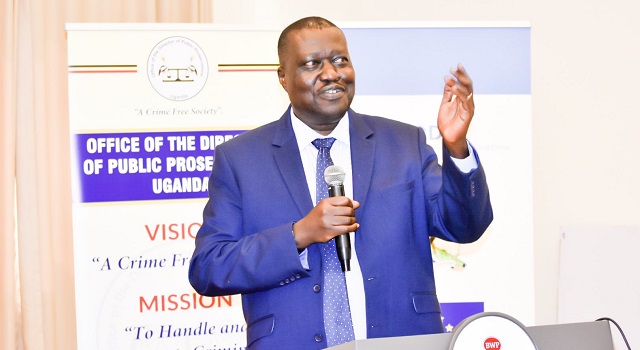
Kampala, Uganda | THE INDEPENDENT | The Director of Public Prosecutions-DPP says the new guidelines for investigating and prosecuting wildlife crimes will lead to more convictions.
The guidelines, “Points to Prove”- A Guide for Prosecutors and Investigators including the new Uganda Wildlife Act, 2019, Sample Charges and Standard Operating Procedures”, have been developed for better management of wildlife offences in the country.
The Uganda Wildlife Act, 2020 lays out several offences which include entering protected areas illegally, illegal hunting, wounding, and killing of wildlife, possessing, selling, buying and transferring of protected species among others.
The guidelines however also include offences and penalties in related laws such as the National Forestry and Tree Planting Act, 2003, the Firearms Act and the East African Community Customs Management Act, 2004 (amended 2009).
Speaking at the launch of the guidelines at Garden Hotel in Entebbe, Charles Elem-Ogwal, the deputy DPP in charge of prosecutions said that wildlife crimes are rampant and the guidelines will be key in securing convictions.
Barbara Kawuma, the Assistant Director of Public Prosecutions-DPP, said a total of 566 cases were taken to court between January and June 2021. Of these, 242 cases were convicted, which involved people found in possession of illegal wildlife and products such as elephant tusks, tortoises, pangolins and pangolin scales, while more than 200 cases are pending in court, including four men who allegedly killed six lions in Queen Elizabeth National Park early this year.
In 2020, 373 cases were taken to court compared to the 513 cases in 2019.
Ogwal says the office of the DPP would like to secure a conviction rate of 100 percent for the cases taken to court. However, this is a toll order because the directorate has a staffing gap of 52 percent.
Kawuma says that the guidelines will act as a tool kit. For instance, she says investigators will now have to arrest suspects and charge them after 80 percent of the investigations have been carried out and there is evidence that implicates them.
Irene Nakimbugwe, the deputy spokesperson at the office of the DPP, says the office hopes to register more cases once courts reopen fully.
Javier Montano, the regional coordinator UNODC programme for Combating Wildlife Forest Crime for Eastern and Southern Africa, said the guidelines have been developed by officials from ODPP, Uganda Wildlife Authority-UWA, National Forest Authority-NFA, and civil society organizations.
Montano explains that Kenya, Tanzania, and Botswana started implementing similar guidelines in the past 18 months.
Montano says UNODC will review the implementation of the guidelines in Uganda after a year to assess their impact.
Dr James Musinguzi, the Executive Director of Uganda Wildlife Education Conservation Centre-UWEC, says that wildlife crimes could result in the extinction of protected species.
He says wildlife crimes generate between USD 7 Million to USD 23 Million a year, which threatens biodiversity conservation and also revenue generation from tourism.
*****
URN
 The Independent Uganda: You get the Truth we Pay the Price
The Independent Uganda: You get the Truth we Pay the Price



